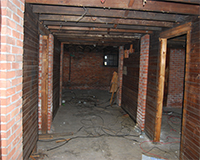Neighbour triumphs in challenge to basement PDR decision
A judge today quashed a Camden Council decision to the effect that a basement development could be carried out under permitted development rights (PDRs).
The council issued a lawful development certificate to James Ireland in respect of the planned single-storey basement at 24 Quadrant Grove, NW5.
However, neighbour Michael Eatherley, of number 26, challenged that decision in a case which his counsel, Martin Westgate QC, had argued raises “fundamental questions” about the scope of PDRs when it comes to subterranean development.
A judge today quashed a Camden Council decision to the effect that a basement development could be carried out under permitted development rights (PDRs).
The council issued a lawful development certificate to James Ireland in respect of the planned single-storey basement at 24 Quadrant Grove, NW5.
However, neighbour Michael Eatherley, of number 26, challenged that decision in a case which his counsel, Martin Westgate QC, had argued raises “fundamental questions” about the scope of PDRs when it comes to subterranean development.
In the first case to raise the question of whether a residential basement extension is or can be a PDR under Class A of the Town and Country Planning (General Permitted Development) (England) Order 2015, Eatherley argued that the development would involve a substantial engineering operation, which does not fall within the Class A PDR.
Backing the challenge, and quashing the decision, Cranston J said that the case raised a question about the extent to which subterranean development can be carried out, without the need for planning permission, under the current regime of PDRs.
The judge said: “The question is of general interest but arises particularly frequently in central London because of economic and social factors, in general terms, the increasing pressure for space.
“It is a matter of controversy in the planning world and there is a split between local planning authorities as to the correct answer.”
Ruling that the council had misdirected itself in this case, he added: “In my judgment, the planning committee asked itself the wrong question with its focus on the works being ‘entirely part’ of the overall development, which would ‘by necessity’ involve engineering works.
“It concluded that because this was the case it followed that the works did not constitute a separate activity of substance. That is not the approach laid down in the authorities.
“The council’s conclusion that the engineering works were not a separate activity of substance followed from a misdirection. The council needed to address the nature of the excavation and removal of the ground and soil, and the works of structural support to create the space for the basement.”











